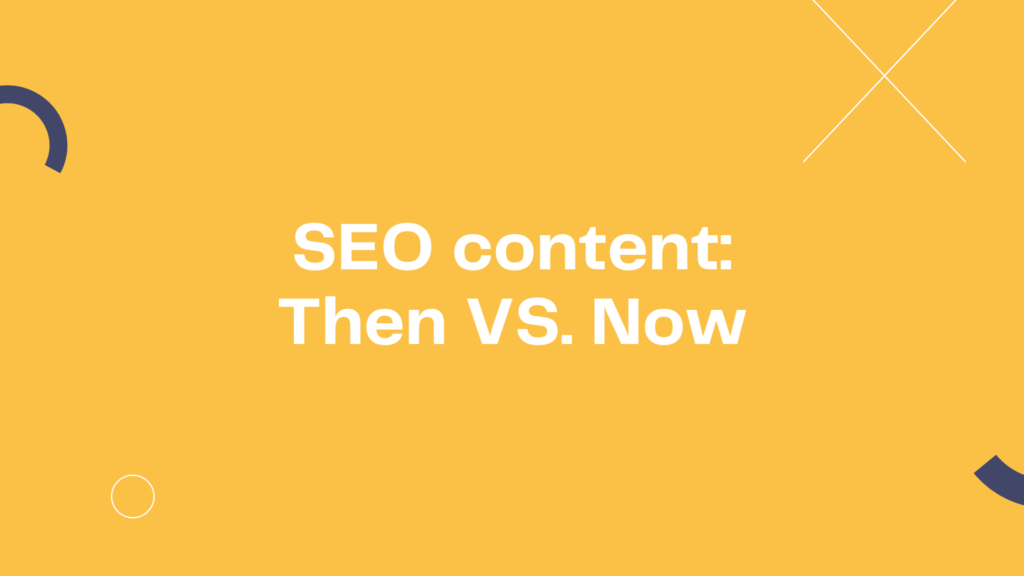If you’re new to the world of SEO, we know how you feel. It’s complex, it’s confusing, and with all that’s going on right now, some experts are even saying that SEO is dead. But it isn’t. The digital world is fast-paced and is dominated by websites and content that check the boxes for the mighty SEO. And if you want to stand out, you need to create a solid SEO strategy. SEO, or search engine optimization, is not just a buzzword (believe us)—it’s a dynamic practice that can significantly impact your online presence. As a beginner, going through tons of articles, podcasts, and research is cumbersome. But there are some old tricks that are still relevant and, if used correctly and consistently for your content, can win you the success you need in no time. This article will primarily cover the following:
Table of contents
- What is SEO content?
- SEO content in 2024
- How to write SEO content?
- How to optimize content for SEO?
What is SEO Content?
First, – what exactly does SEO content mean? SEO content simply refers to the creation and optimization of online content with the goal of improving its visibility in search engine results. The primary objective is to attract organic (non-paid) traffic to a website by enhancing its relevance and credibility in the eyes of search engines. In simpler terms, SEO content is any content—be it blog posts, articles, product descriptions, or other web material—crafted with a strategic approach to appeal to search engines. The aim is to rank higher in search results, making it more likely for users to discover and engage with the content.
Elements of SEO Content in 2024
SEO content can be broken down into five critical elements, which, bound together, can help you create content that converts.
- Relevance: SEO content is tailored to address specific topics, questions, or needs that users commonly search for. It aligns with the interests and intent of the target audience.
- Keywords:These are specific terms or phrases that users are likely to type into a search engine. SEO content naturally incorporates relevant keywords to increase visibility.
- Quality: Beyond keywords, search engines prioritize high-quality content. SEO content is not just about meeting search engine criteria but also delivering value to the audience.
- User Experience: A crucial factor in SEO content is creating a positive experience for the user. This involves factors like mobile-friendliness, page speed, and overall site usability.
- Optimization: The content is optimized both on-page and technically. On-page optimization involves using keywords in titles, headings, and throughout the content. Technical optimization ensures that the website’s structure and code contribute to better search engine performance.
As search engines evolve, staying informed about the latest SEO practices is essential for creating effective SEO content.
Understanding SEO Content Writing in 2024
In 2023, we’ve seen several major changes in the SEO landscape, with Google focusing more on E-A-T (Expertise, Authoritativeness, and Trustworthiness), user experience, and mobile-first indexing. We can expect these trends to continue in 2024, with some exciting new developments on the horizon.
Here are some of the key things you can expect to see:

Increased Focus on Expertise, Authoritativeness, and Trustworthiness (E-A-T)
Google has been emphasizing E-A-T for several years now, and this trend is only going to get stronger in 2024. This means that it will be more important than ever to create high-quality content from experts in their field. You can do this by:
- Hiring experienced writers and editors.
- your content reviewed by experts.
- Building relationships with other experts in your industry.
- credible sources in your content.
More Emphasis on User Experience (UX)
Google wants to provide the best possible user experience for its searchers. This means that your content needs to be:
- Well-structured and easy to read.
- Engaging and informative.
- Mobile-friendly.
- Fast-loading.
You can improve your UX by:
- Using clear and concise language.
- Breaking up your content with images and videos.
- Using headings and subheadings to make your content scannable.
- Optimizing your website for mobile devices.
Continued Rise of Long-Form Content
Google has been rewarding long-form content for a while now, and this trend is likely to continue in 2024. This is because long-form content tends to be more comprehensive and informative, which is what Google wants to see.
If you want to rank higher in search results, you should focus on creating long-form content that is at least 2,000 words long.
Even More Mobile-First Indexing
Google has already switched to mobile-first indexing for most websites. This means that they primarily use the mobile version of your website to rank it in search results. If you want to rank well in 2024, you need to make sure your website is mobile-friendly. You can do this by:
- Using a responsive design.
- Optimizing your images for mobile devices.
- Testing your website on different mobile devices
The Rise of Voice Search
Voice search is becoming increasingly popular, and this is likely to continue in 2024. This means that you need to optimize your content for voice search by:
- Using natural language.
- Answering common questions in your content.
- Using long-tail keywords.
The Growth of Artificial Intelligence (AI)
AI is playing an increasingly important role in SEO. For example, Google is using AI to:
- Better understanding of user intent.
- Rank websites based on relevance.
- Personalize search results.
This means that you need to start thinking about how AI will impact your SEO strategy. You can do this by:
- Creating content that is relevant to user intent.
- Using AI tools to help you with keyword research and content creation.
- Staying up-to-date on the latest AI trends in SEO.
The Decline of Traditional Keyword Research
Traditional keyword research is becoming less important as Google gets better at understanding user intent. This means that you need to focus on creating content that is relevant to user intent rather than just stuffing your content with keywords. You can do this by:
- Using topic modeling to identify relevant topics.
- Creating content that answers common questions.
- Using long-tail keywords.
The Rise of Google Search Generative Experience (SGE)
Google Search Generative Experience (SGE) is a new way for Google to display search results. It uses AI to generate short summaries of websites that appear at the top of the search results page.
This means that you need to make sure your website is SGE-friendly by:
- Creating high-quality content.
- Structuring your content in a way that is easy for AI to understand.
- Using relevant keywords in your content.
The Continued Importance of Backlinks
Backlinks are still an important ranking factor in 2024. This means that you need to focus on building high-quality backlinks to your website. You can do this by:
- Creating guest posts for other websites.
- Submitting your website to directories.
- Building relationships with other bloggers and influencers.
Apart from these, you may also witness significant impacts from the following:The impact of Google MUM: Google’s Multitask Unified Model (MUM) is a powerful AI tool that can understand and generate text, translate languages, and answer your questions in an informative way. It’s likely that MUM will play an even bigger role in SEO in 2024.The rise of visual search: Visual search is becoming increasingly popular, so you need to optimize your content for visual search by using relevant images and videos and including descriptive alt text.importance of local SEO: If you have a local business, you need to make sure your website is optimized for local search. You can do this by:
- Creating a Google My Business listing.
- Getting your website listed in local directories.
- Using local keywords in your content.
How to Write SEO Content in 2024: 4 Steps [Beginner-Friendly]

Now that you know your key focus areas, here’s how you can write SEO content like a pro:
#1 – Keyword Research and Targeting
Keyword research is the cornerstone of any successful SEO strategy. By understanding the words and phrases your audience uses, you can tailor your content to meet their needs effectively.
Tools like Google Keyword Planner, Ahrefs, and SEMrush provide valuable insights into search volume, competition, and related keywords. When selecting your target keywords, aim for a balance between search volume and competition—identifying those with high search volume and low competition gives you a competitive edge.
Actionable strategies:
- Conduct thorough keyword research using tools like Google Keyword Planner, Ahrefs, and SEMrush.
- Focus on long-tail keywords for specificity and user relevance.
- Optimize your content for multiple keywords, embracing variations and related terms naturally.
- Explore semantic keywords to capture a broader range of search queries.
#2 – Writing and Optimizing Content for SEO
High-quality, valuable content not only attracts readers but also keeps them engaged and encourages them to share your content. Structure your content for readability by using headings, subheadings, and bullet points. This not only makes it easier for readers to digest information but also signals to search engines that your content is well-organized.
When it comes to meta descriptions and title tags, think of them as your content’s elevator pitch. Concisely convey what your content is about while incorporating your target keywords naturally. Don’t forget the power of internal linking—guide your readers to other relevant pages on your site, improving user experience and website structure.
Actionable strategies:
- Prioritize content that addresses user problems and provides solutions.
- Experiment with different content formats, such as infographics, videos, and podcasts.
#3 – Technical SEO Optimization for SEO Content
Technical SEO is all about your website’s performance in search engine rankings. Mobile-friendliness is a must, considering the increasing use of smartphones for online searches. Google’s Mobile-Friendly Test tool is a handy resource to ensure your website is optimized for mobile devices.
Website speed is also a critical factor in user experience and search engine rankings. Utilize caching plugins, optimize images, and minify code to improve your website’s loading speed. Additionally, regularly submitting your website to search engines through platforms like Google Search Console and Bing Webmaster Tools ensures that your site is properly indexed and appears in search results.
And finally, don’t overlook the potential of repurposing and updating old content. This not only keeps your website fresh but also signals to search engines that your content is current and relevant.
Actionable strategies:
- Implement schema markup for additional context.
- Set canonical tags to avoid duplicate content, and specify the preferred version of a page for clarity.
- Secure your site with an SSL certificate.
- Enable HTTPS for improved security and search engine ranking.
- Customize 404 error pages for a better user experience.
- Provide helpful information and guide users back to relevant content.
#4 – Content Promotion and Off-Page Strategies for SEO
Off-page SEO is about building your website’s credibility and authority through external factors. Backlinks from authoritative websites are a powerful signal to search engines that your content is trustworthy and valuable. Explore guest blogging opportunities, resource page link-building, and fixing broken links on other sites to build a diverse and strong backlink profile.
Social media is not just for connecting with your audience—it’s also a valuable platform for content promotion. Share your content on relevant social media channels to increase visibility and attract traffic. Additionally, email marketing remains a powerful tool for engaging your audience. Build an email list and send newsletters to keep your audience informed about new content and updates.
Active participation in online communities and directories related to your industry can also boost your online presence. Share your expertise, answer questions, and contribute valuable insights to establish your authority.
Consider encouraging user-generated content. User reviews, testimonials, and other forms of user-generated content not only enhance your online reputation but also contribute to your overall SEO efforts.
- Get links from other sites by contributing content to trusted platforms.
- Explore herd link opportunities from high-moderated forums.
- Encourage user-generated content like reviews and testimonials.
- Utilize tools like Google Alerts to monitor brand mentions and respond proactively.
Bonus Action Tips for SEO Content Writing in 2024
Getting ahead of the competition is tricky, but with the help of this guide, you can stay competitive and achieve great results. Additionally, here are a few things you must be on top of to overcome any SEO challenges.
- Stay up-to-date with Google algorithm updates: Subscribe to Google alerts and relevant blogs to stay informed about changes.
- Experiment with different content formats: Explore video content, infographics, interactive elements, and data-driven articles.
- Prioritize voice search optimization: Use conversational language and answer frequently asked questions in your content.
- Collaborate with influencers and industry experts: Build relationships and leverage their reach to promote your content.
- Offer exceptional customer service: Building trust and positive experiences can lead to organic promotion and increased website traffic.
Wrapping Up
Remember, SEO is a journey, not a race. It’s all about consistent effort, continuous improvement, and a data-driven approach. Remember, success in SEO is a gradual process, not an overnight sprint. So, embrace the journey, try out different strategies, and stay updated on the latest trends. We hope this comprehensive guide equips you with the knowledge and tools necessary to master SEO content this year. Best of luck on your journey to SEO success!
